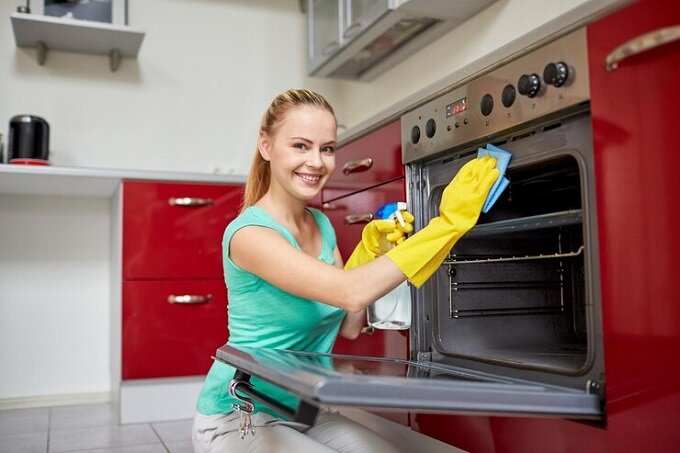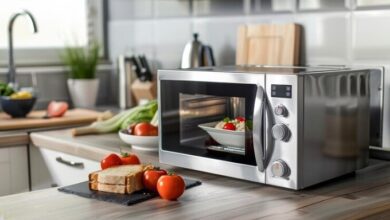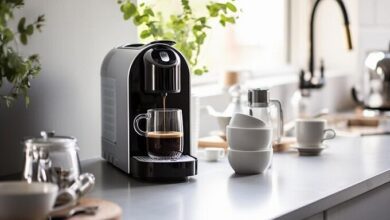How to Care for Appliances to Extend Their Lifespan

We all know that care for appliances are a big investment, and keeping them running smoothly for as long as possible is important. But did you know that with proper care and maintenance, you can significantly extend the lifespan of your home appliances? In this article, we will teach you how to do just that. We’ll cover everything from understanding your appliances and their lifespans to general and appliance-specific maintenance tips. We’ll also troubleshoot common issues and provide tips to help your appliances last longer. So, whether you’re looking to prolong the life of your refrigerator, washer, or dryer, we’ve got you covered!
Key Takeaways
- Proper appliance maintenance can extend the lifespan of your appliances, saving you money and hassle in the long run.
- Regular cleaning, inspecting for wear and tear, and using the right cleaning products are key to appliance care.
- Specific appliances have unique maintenance needs, such as refrigerator coils, washing machine lint traps, and oven temperature calibration.
- Troubleshooting common issues and knowing when to DIY or call a professional are important skills for appliance owners.
- Creating a maintenance schedule, utilizing home warranties, and educating family members can further extend the lifespan of your appliances.
Understanding Your Appliances
Types of Appliances
There are three main types of appliances in the average American home: kitchen appliances, laundry appliances, and other appliances.
Kitchen Appliances
- Refrigerator and freezer: Used daily to store perishable food items and keep them fresh.
- Oven: Essential for cooking and baking, it provides heat to prepare meals.
- Dishwasher: This appliance cleans and sanitizes dishes, pots, and pans, saving time and effort.
- Other kitchen appliances may include a coffee maker, toaster, blender, or microwave.
Laundry Appliances
- Washing machine: Used to clean clothes, linens, and other fabrics.
- Dryer: This appliance completes the laundry process by drying clothes after washing.
Other Appliances
- Air conditioner: Regulates the temperature and humidity in your home, providing comfort during warm months.
- Other “other” appliances may include a vacuum cleaner, iron, or water heater.
The Concept of Lifespan
Appliance lifespan refers to the expected duration of an appliance’s functional and efficient operation. This lifespan can vary depending on several factors:
- Usage: How often and for how long an appliance is used will impact its lifespan. For example, a refrigerator in a large family home will likely have a shorter lifespan than one in a single-person household.
- Maintenance: Proper care and maintenance can significantly extend an appliance’s lifespan, while neglect can lead to premature failure.
- Environment: The surrounding environment, including temperature, humidity, and ventilation, can affect an appliance’s performance and lifespan.
General Maintenance Tips for All Appliances
Regular Cleaning
Keeping your appliances clean is crucial for prolonging their lifespan. Dust, dirt, and grime can build up over time, impacting performance and potentially causing damage. Here are some general cleaning tips:
- Refer to the user manual for specific cleaning instructions, as different appliances have different needs.
- Use a soft, damp cloth to wipe down exterior surfaces, removing any spills or buildup.
- For tougher stains, create a mild cleaning solution with warm water and a small amount of dish soap.
- Avoid using abrasive cleaning tools or harsh chemicals, as these can damage surfaces and finishes.
- Pay extra care to rubber seals and gaskets, as buildup in these areas can impact the appliance’s performance and energy efficiency.
Inspecting for Wear and Tear
Regularly inspect your appliances for signs of wear and tear. This includes checking key areas such as gaskets, seals, and filters. Look for cracks, tears, or signs of deterioration, and replace these components as needed. Other signs of wear may include:
- Unusual noises or vibrations during operation.
- Leaks or water damage around the appliance.
- Burning smells or signs of overheating.
- Decreased performance or efficiency.
Using Proper Cleaning Products
When cleaning your appliances, it’s important to use safe and appropriate cleaning products. Here are some recommendations:
- White vinegar: Vinegar is a mild acid that can cut through grease and grime. Use a solution of equal parts vinegar and water, or apply it directly to a damp cloth.
- Baking soda: This mild abrasive can be used to gently scrub away buildup. Create a paste with water and apply it to the affected area.
- Mild dish soap: A small amount of dish soap in warm water can be used for general cleaning.
- Avoid using harsh chemicals, bleach, or abrasive cleaning tools, as these can damage appliance surfaces.
Appliance-Specific Maintenance Tips
Each appliance has unique maintenance needs. Here are some tips for common household appliances:
Refrigerator
- Clean the condenser coils: Located at the back or bottom of your fridge, these coils can collect dust and dirt, impacting the refrigerator’s ability to cool efficiently. Use a vacuum or soft brush to clean them every 6-12 months.
- Check and replace door seals: Ensure the rubber seals are intact and pliable, creating an airtight seal when the door is closed. Replace them if you notice cracks or hardening.
- Maintain optimal temperature settings: Keep your refrigerator between 35-38°F and your freezer at 0°F for best food preservation and energy efficiency.
Washing Machine
- Balance the machine: An unbalanced washer can vibrate excessively, causing damage over time. Ensure your machine is level and adjust the feet if needed.
- Clean the lint trap and detergent dispenser: Remove lint from the trap after each use, and clean the detergent dispenser regularly to prevent buildup.
- Run maintenance cycles: Once a month, run a cycle with vinegar or baking soda to help remove soap scum and odors.
Dishwasher
- Regularly clean the filter and spray arms: Located at the bottom of the dishwasher, the filter can become clogged with food particles. Clean it regularly, along with the spray arms, to ensure optimal performance.
- Run empty cycles with vinegar: To control odors, run an empty cycle with vinegar every few months to clean and sanitize the interior.
- Inspect door seals and hoses: Ensure the door seal is intact and hoses are securely connected to prevent leaks.
Oven
- Regular cleaning of the interior and exterior: Use a mild cleaning solution and a soft sponge to wipe down the interior and exterior surfaces, removing any spills or buildup.
- Check and calibrate temperature settings: Use an oven thermometer to ensure the temperature is accurate. Adjust the settings if needed to ensure even cooking.
- Inspect heating elements: Look for signs of damage or corrosion, and replace them if necessary.
Dryer
- Clean the lint trap after every use: A clogged lint trap is a fire hazard and can reduce the efficiency of your dryer.
- Inspect and clean venting systems: Longer vents may need to be cleaned more frequently to prevent clogs and reduce drying times.
- Check for signs of overheating: This includes burning smells, prolonged drying times, and unusually hot exterior surfaces.
Air Conditioner
- Clean or replace air filters: A dirty air filter reduces the efficiency of your AC and can lead to higher energy bills. Clean or replace them as recommended by the manufacturer.
- Inspect condenser coils and drain lines: These can become clogged with dirt and debris, impacting the AC’s performance. Clean them regularly and check for any blockages.
- Schedule professional maintenance: Annual maintenance by a qualified technician can help ensure your AC is running optimally and catch any potential issues early on.
Troubleshooting Common Appliance Issues
Identifying Minor Problems
Some common issues you may encounter with your appliances include:
- Noisy appliances: Unusual noises, such as rattling or buzzing, could indicate a loose part, a buildup of dirt or debris, or a more serious mechanical issue.
- Odors from dishwashers and refrigerators: Persistent odors can be caused by food residue, mold, or a clogged drain.
- Leaks and water damage: Leaks can be due to a variety of issues, including clogged drains, faulty hoses, or damaged seals.
DIY Solutions
Many common issues can be resolved with simple DIY fixes:
- Unclogging drains: Remove any debris or buildup causing the clog.
- Adjusting levels: Ensure your appliances are level to prevent excessive vibration and wear.
- Cleaning buildup: Use the recommended cleaning solutions to remove grime and buildup from surfaces and components.
When to Call a Professional
While some issues can be handled by a handy homeowner, others require the expertise of a qualified appliance repair technician. It’s important to know when to call for professional help to avoid further damage or unsafe conditions. Here are some scenarios where professional repair is recommended:
- Electrical issues: Problems with power supply, blown fuses, or faulty wiring should be handled by a professional to ensure safety.
- Complex mechanical repairs: Repairs involving disassembling the appliance or accessing complex components are best left to experts.
- Gas appliance issues: Problems with gas ovens or dryers should always be addressed by a professional due to the risk of gas leaks or carbon monoxide poisoning.
Tips to Extend the Lifespan of Your Appliances
Regular Maintenance Schedule
Consistency is key when it comes to appliance maintenance. Create a maintenance calendar to keep track of when each appliance needs attention:
- Mark down recommended cleaning and maintenance intervals for each appliance, as outlined in their user manuals.
- Set reminders to ensure you don’t miss a maintenance task.
- Keep a log of any repairs or replacements, including the date and any relevant details.
Utilizing Home Warranties
A home warranty can provide additional peace of mind and help extend the lifespan of your appliances. Here’s how:
- Understand your coverage: Home warranties typically cover major appliances and systems in your home, offering repair or replacement services for a set fee.
- Benefits: With a warranty, you’ll have access to qualified technicians and potentially save on repair costs.
- Consider the terms: Review the terms and conditions to understand what is and isn’t covered, as well as any exclusions or limitations.
Educating Family Members
Ensuring that all household members understand the proper use and care of appliances can help prevent damage and extend their lifespan:
- Teach proper usage: Instruct family members on how to correctly operate each appliance, including any specific dos and don’ts.
- Emphasize responsible use: Encourage everyone to treat appliances with care, avoiding misuse or abuse that could lead to damage.
- Provide maintenance tips: Share the importance of regular cleaning and maintenance, and assign age-appropriate tasks to involve everyone in appliance care.
Conclusion
Proper care and maintenance of your appliances can have a significant impact on their lifespan, saving you money, time, and hassle in the long run. By understanding your appliances, performing regular maintenance, and knowing when to call for professional help, you can keep them running smoothly for years to come.
Remember, a well-maintained home is a happy home, and with these tips, you’ll be able to extend the lifespan of your appliances, enjoy their optimal performance, and potentially avoid costly repairs. So, roll up your sleeves, grab your sponge, and get started on your appliance care journey!



